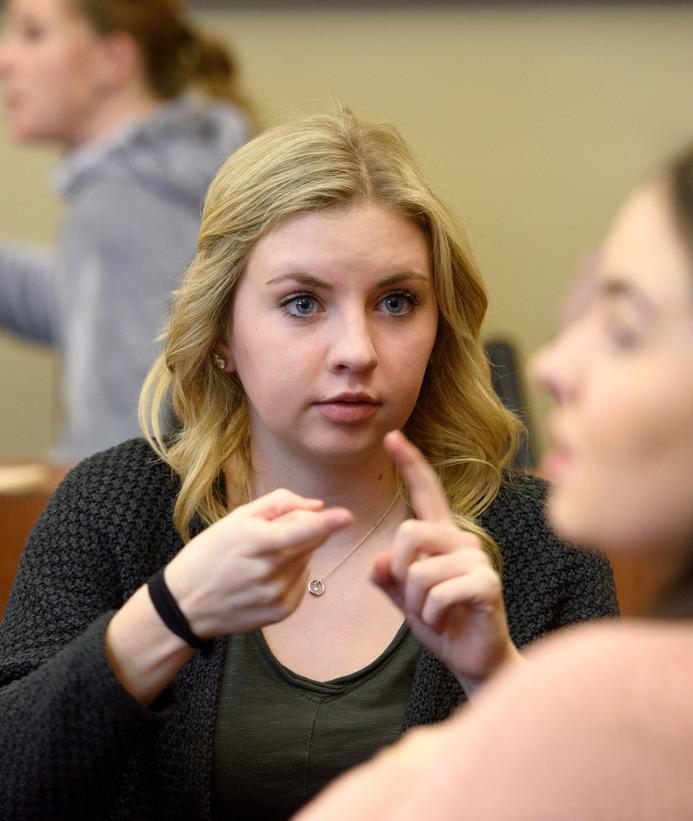About ASL Studies at UW
The ASL Studies certificate may be helpful to anyone in the health and education fields
for learning to communicate with and understand individuals who are deaf. The certificate
is a nominal recognition for students who wish to pursue more education in the fields
of speech-language pathology, sign language interpreter, teacher of the deaf, preschool
and K-12 education, audiology, nursing, counseling and other areas.
The ASL Studies certificate from UW recognizes basic or beginning ASL skills and foundational
knowledge of Deaf Culture. The ASL Studies Certificate is not designed to meet educational
requirements for any specific professional license or certification. It does not prepare
or entitle a student or recipient for any certification or licensure from any state
or national associations, agencies, or governmental bodies. It does not indicate ASL
proficiency and does not relate to a professional endorsement for services as an interpreter.
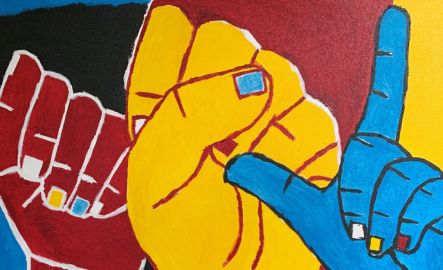
The ASL classroom at the University of Wyoming is a full immersion environment. This means that silent classrooms are employed and students are fully immersed in learning and using visual language. The classes focus on basic conversation, dialogue and vocabulary development. Students also learn ASL sentence structure and grammar, intermixed with aspects of Deaf culture. The instructors employ a highly interactive and engaging teaching style. Students are assessed on both their receptive skills (understanding what is signed) and expressive skills (producing ASL accurately).
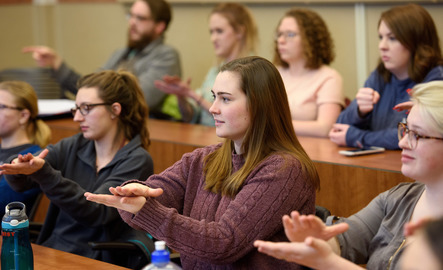
The Five Required Courses for the ASL Studies Certificate (16 credit hours):
- American Sign Language I. Basic knowledge of and proficiency in American Sign Language (ASL). ASL vocabulary, grammar, and pragmatics are taught through lecture, conversation and storytelling. The direct experience method, which employs ASL without speech, is used to enhance the learning process. (4 credits)
- American Sign Language II. Second level of understanding and expression in ASL. Through lectures, conversations and stories, students learn the vocabulary, grammar, and pragmatics of ASL as well as how to sign more fluently. Translation from ASL to English is practiced. (4 credits)
- Deaf Studies. Studies Deaf culture and Deaf history in the U.S. from the 1700s to the present. Along with difficulties concerning Deaf children as a linguistic minority, culture subjects will also include deaf community dynamics, humor, behavior, emotional development, and social interaction. (3 credits)
- Advanced ASL. Third level of understanding and expression in ASL. Focuses on improving ASL fluency, specialized vocabulary, such as sexual and religious terms and register variation for various conversational participants. Translation from ASL to English is practiced. (4 credits)
- Undergraduate Teaching Assistant. Students who have successfully completed the required classes, including earning an A in all the language courses, will support instructors by attending classes, holding tutor sessions, preparing lessons, and grading assignments. (1 credit) One semester credit requires 4 hours of work per week.
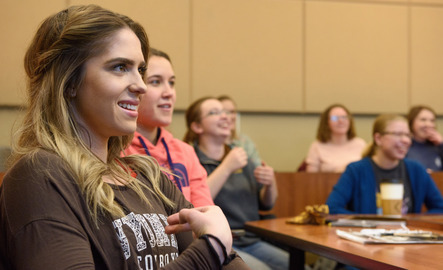
View the full American Sign Language Studies Certificate degree program curriculum.
What Can You Do With an ASL Studies Certificate?
The ASL Studies Certificate will benefit students who wish to pursue more education in the fields of speech-language pathology, sign language interpreter, teacher of the deaf, preschool and K-12 education, audiology, nursing, counseling and other areas.
American Sign Language Studies Certificate Student Learning Outcomes and Objectives
*approved by faculty 3/29/2022
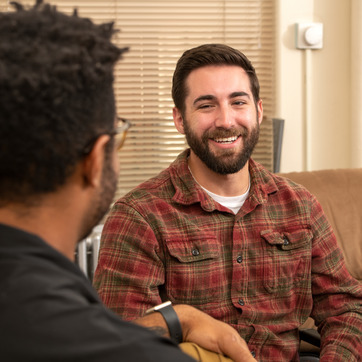
Mastery of the skill will be demonstrated by:
- Produce accurate presentations of ASL following the five parameters of ASL.
- Interpret fluent signers’ presentations both live and recorded on a variety of topics.
- Demonstrate conversational skills in ASL to obtain information, exchange opinions, and express emotions.
Mastery of the skill will be demonstrated by:
- Summarize and analyze ASL Literature including poetry, art, and music.
- Discriminate between their own culture and other cultures with an emphasis on exploring Deafness as a cultural minority.
Mastery of the skill will be demonstrated by:
- Assess other student’s homework and Receptive Exams
- Support instructors in the classroom and hold tutor sessions for students.
- Prepare lessons for ASL Chats/Labs and research topics relating to ASL and/or Deaf Culture
“Being exposed to Deaf culture and ASL was eye-opening because it illuminated a culture that is not regularly appreciated or discussed in everyday life. Learning about these things has inspired me to consider other world views and the value they offer to our current societal climate. ASL is a beautiful language!"
- Wyatt Christensen

